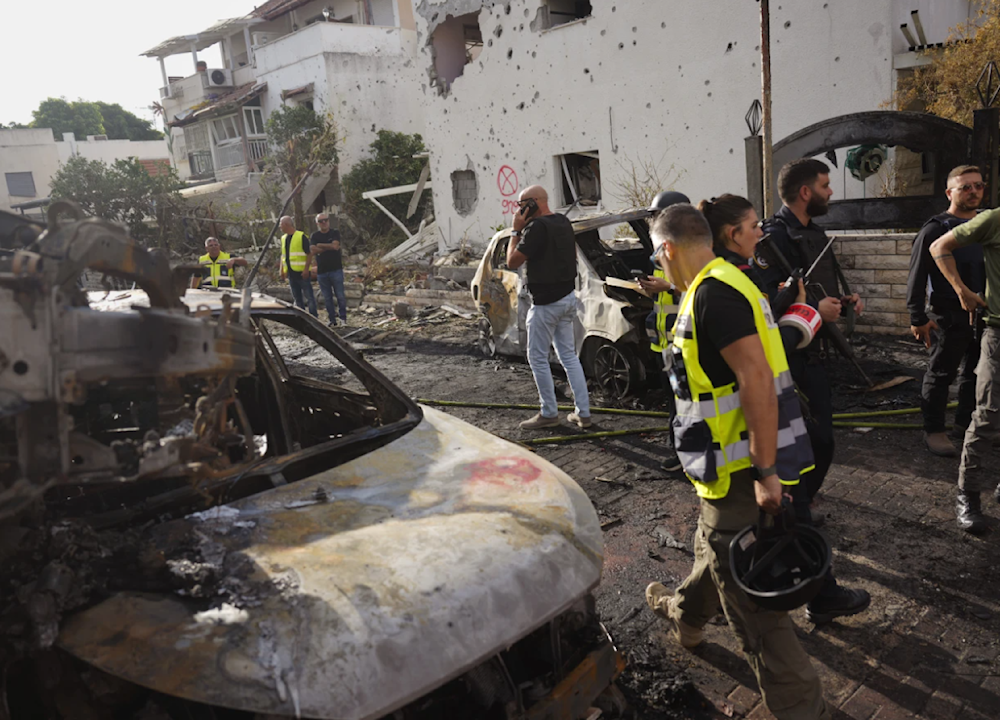Israeli shares fall further on TASE following Hezbollah strikes
The Israeli economy continues to suffer massively amid operations from the Axis of Resistance in support of Gaza.
-

Israeli security forces examine the damage after a rocket fired by Lebanon hit Kiryat Bialik in northern occupied Palestine, on September 22, 2024. (AP)
Shares in the Tel Aviv Stock Exchange continue to fall following a missile barrage by the Lebanese Resistance, Hezbollah.
The Tel Aviv Stock Exchange's benchmark TA-125 index fell 0.8%, while the TA-35 index of blue-chip businesses fell 0.6%, over worries about an all-out regional war.
The TA-90 index, which monitors the highest-capitalized stocks not included in the TA-35 index, fell 0.4%. The TA-Dual Listing index fell 0.7%.
Last week, the TA-35 and TA-90 indexes fell by 2.8% and 3.9%, respectively, while the Dow Jones Industrial Average and S&P 500 Index in the United States increased by 1% and 0.4%.
Earlier, Israeli Army Radio emphasized that Hezbollah "carefully selected its targets and the counter-message it aimed to convey," following the Islamic Resistance in Lebanon's strikes today on the Ramat David base and airport southeast of Haifa, as well as the Rafael military industries complex north of Haifa.
Israeli media responded with sarcasm, noting that the Ramat David base targeted by Hezbollah was the same site from which Israeli Security Minister Yoav Galant declared last Wednesday the "opening of a new phase of the war in the North."
The head of the local authority in the settlement of Kiryat Bialik, located north of occupied Haifa, acknowledged that the fears of settlers regarding potential Hezbollah missile strikes had come to fruition. He expressed concern about the precarious situation the settlers are facing in the North, highlighting that "there are not enough shelters" to protect them from escalating threats.
"For a year, we feared that the rockets would reach us, and now that fear has become a reality," he stated, adding, "We hope we won't have to endure a year like the residents in the North, where there aren't enough shelters for everyone."
The war on Gaza has not only significantly impacted the Israeli occupation's economic standing, but Israelis are growing exhausted and thus are fleeing, according to The Telegraph, and this can be attributed to the potential of an all-out war, with Hezbollah's operation ongoing undeterred despite the Israeli military's claims otherwise.
Nobel laureate Aaron Ciechanover warned of a “huge wave of departures,” noting that “most senior doctors are leaving” and warning that “as soon as 30,000 of these people leave, we won’t have a country here."
'An attack never seen before'
Also from Kiryat Bialik, a settler commented on the Hezbollah missile attack on Sunday, asserting that “something like this has never been seen before, not even in 2006.”
In an interview for the Israeli newspaper Maariv, the settler noted, "There was an assumption that Hezbollah would respond, but not this powerful."
The settler added, referring to the failure of the Iron Dome to intercept the rockets fired by Hezbollah, “There is supposed to be an Iron Dome protecting us, but what happened was quite the opposite.”
Notably, Israeli media reported that at least 13 settlers were injured, one of whom is in critical condition, alongside extensive damage in Kiryat Bialik, where entire homes were burned and approximately 12 buildings were damaged due to the rocket attacks from Lebanon.
Israeli media reported at dawn that there was a "danger to the lives" of the settlers, with some residents of Kiryat Tivon expressing frustration that the shelters they sought refuge in were closed.
These comments come after the Islamic Resistance in Lebanon's strikes at dawn on Sunday against the Ramat David base and airport, using dozens of Fadi 1 and Fadi 2 rockets.
The Resistance also targeted the Rafael military-industrial complex at 6:30 am north of the occupied city of Haifa, also firing dozens of the same rockets.

 4 Min Read
4 Min Read










